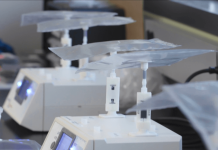Science Corp. announced clinical trial data demonstrating the efficacy of its Prima brain-computer interface (BCI) retinal implant.
Findings published in The New England Journal of Medicine (NEJM) outlined the restoration of functional central vision to patients suffering from geographic atrophy (GA) due to age-related macular degeneration (AMD) with Prima. It marks the latest milestone from the company led by founder Max Hodak, who also co-founded BCI company Neuralink.
Related: Adagio Medical reports findings from ventricular tachycardia study
Alameda, California-based Science owns the Prima retinal implant technology developed by Pixium Vision. The Prima System, a photovoltaic substitute of photoreceptors, already has FDA breakthrough device designation. It provides simultaneous use of the central prosthetic and peripheral natural vision.
Prima restores vision by directly activating the retina if rods and cones have been lost. It features a small light-powered implant placed under the retina and a special pair of glasses. The glasses have an embedded camera and infrared projector that sends light signals to the implant to provide power and data.
Science submitted Prima for commercial availability in the U.S. and Europe in June. As it looks to bring the system to market, it launched a patient registry last month.
“This study confirms that, for the first time, we can restore functional central vision in patients blinded by geographic atrophy,” said Dr. Frank Holz, lead author of the NEJM paper, lead investigator, and Chair of the Department of Ophthalmology at the University Hospital of Bonn. “The implant represents a paradigm shift in treating late-stage AMD.”




